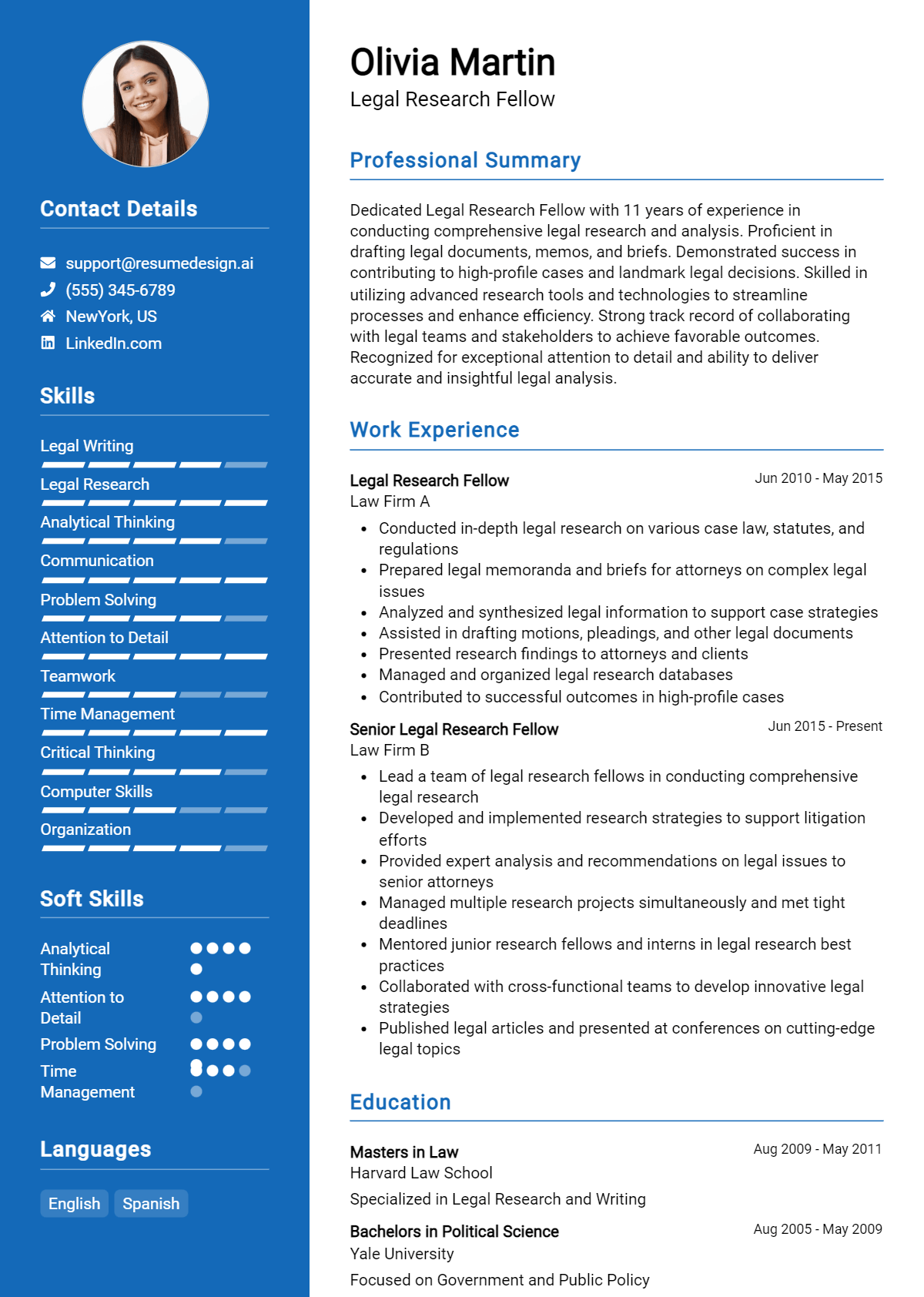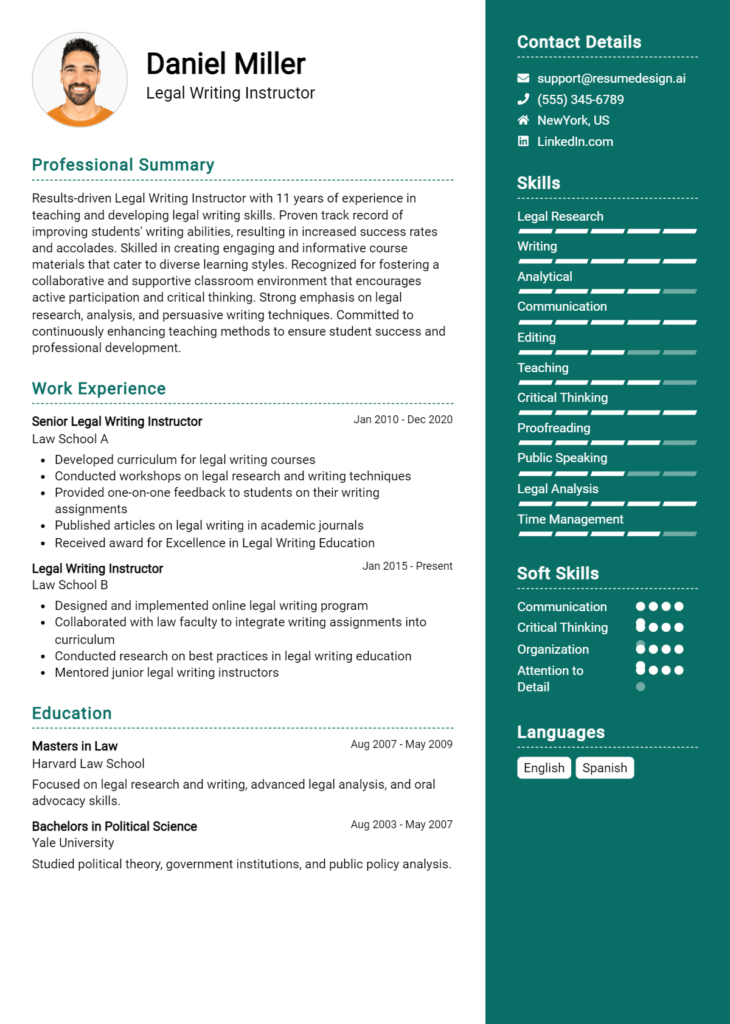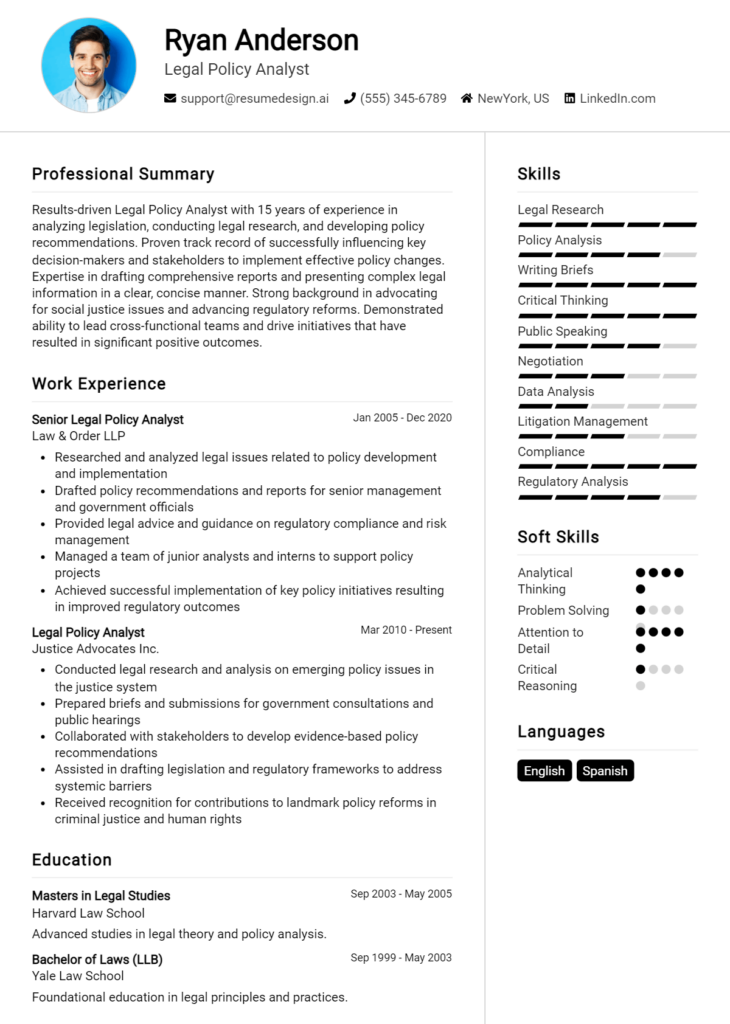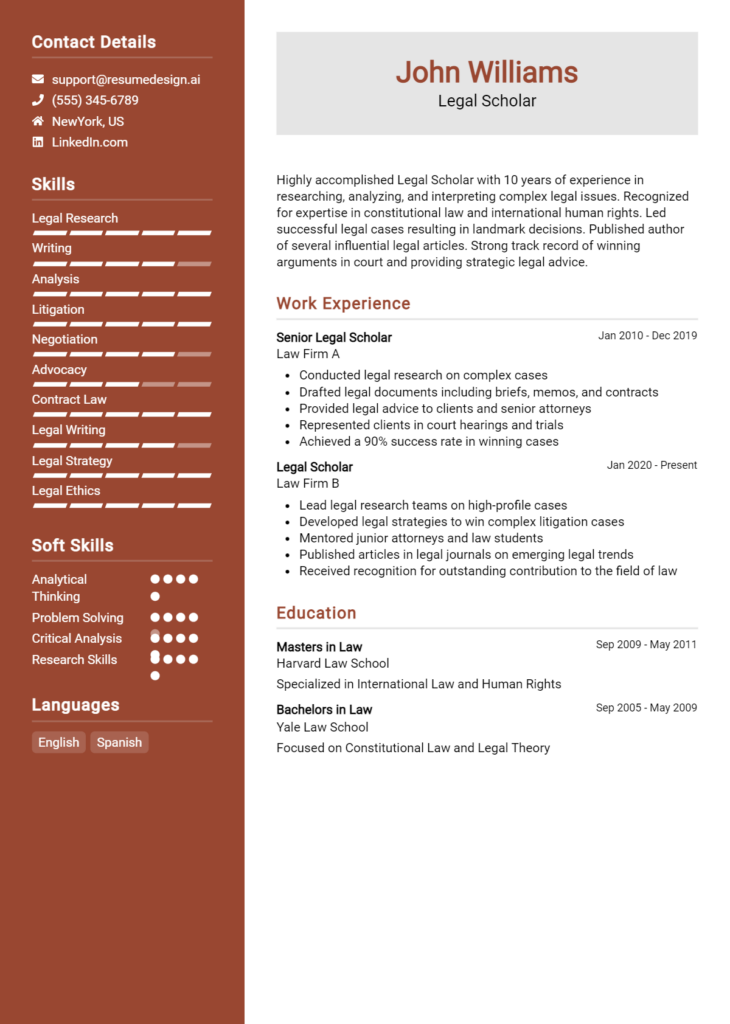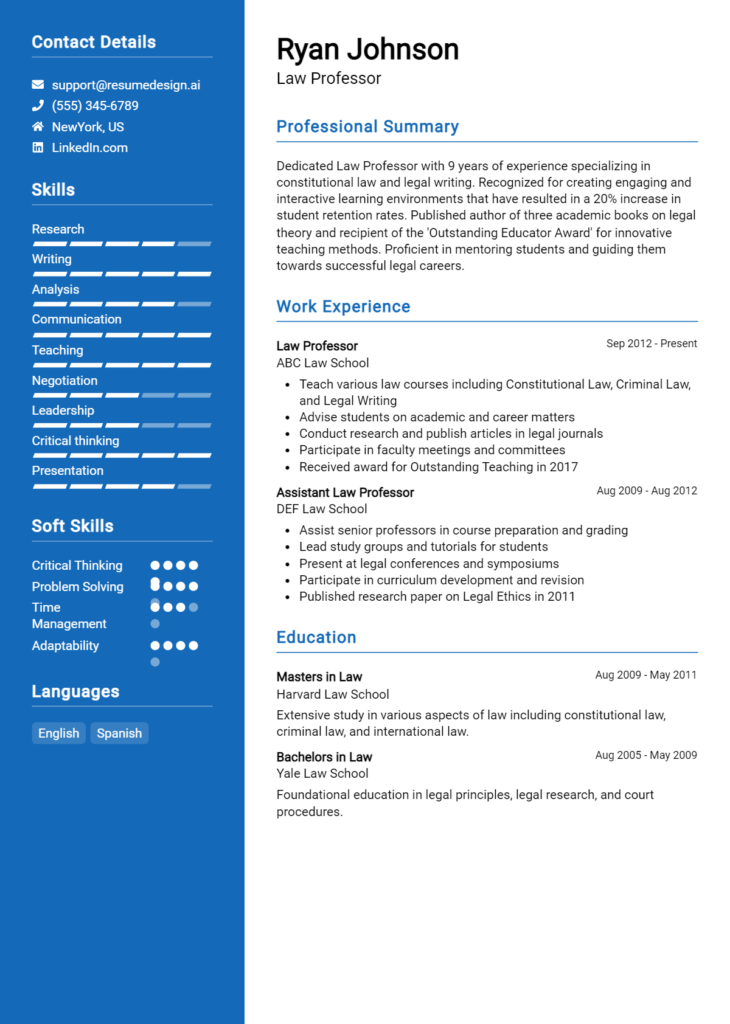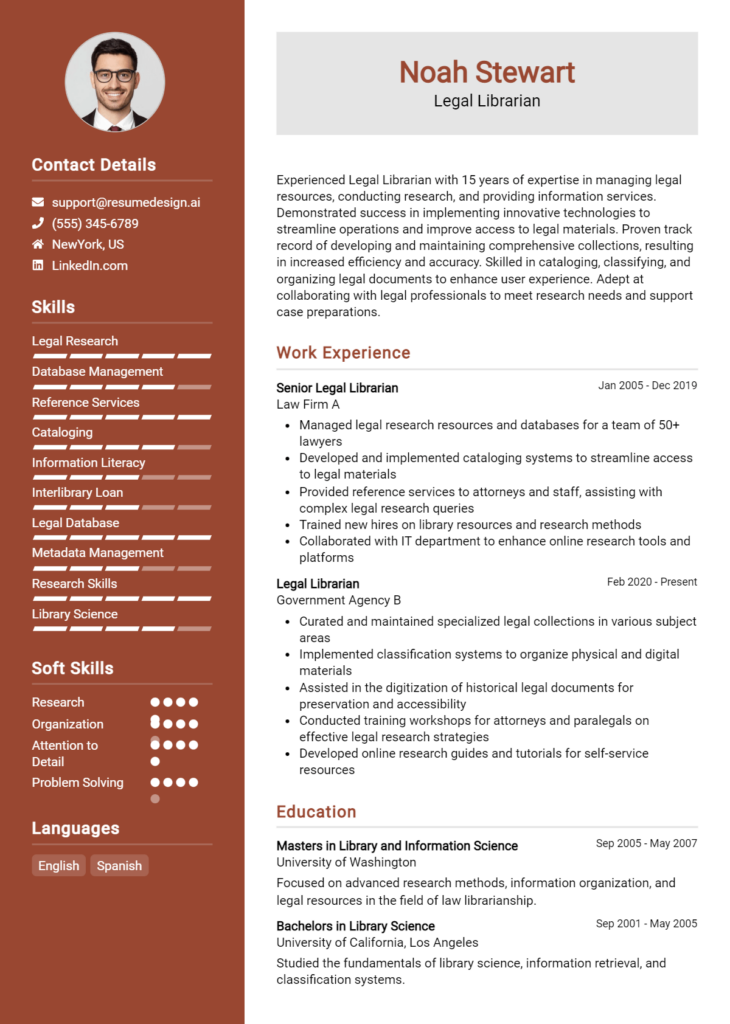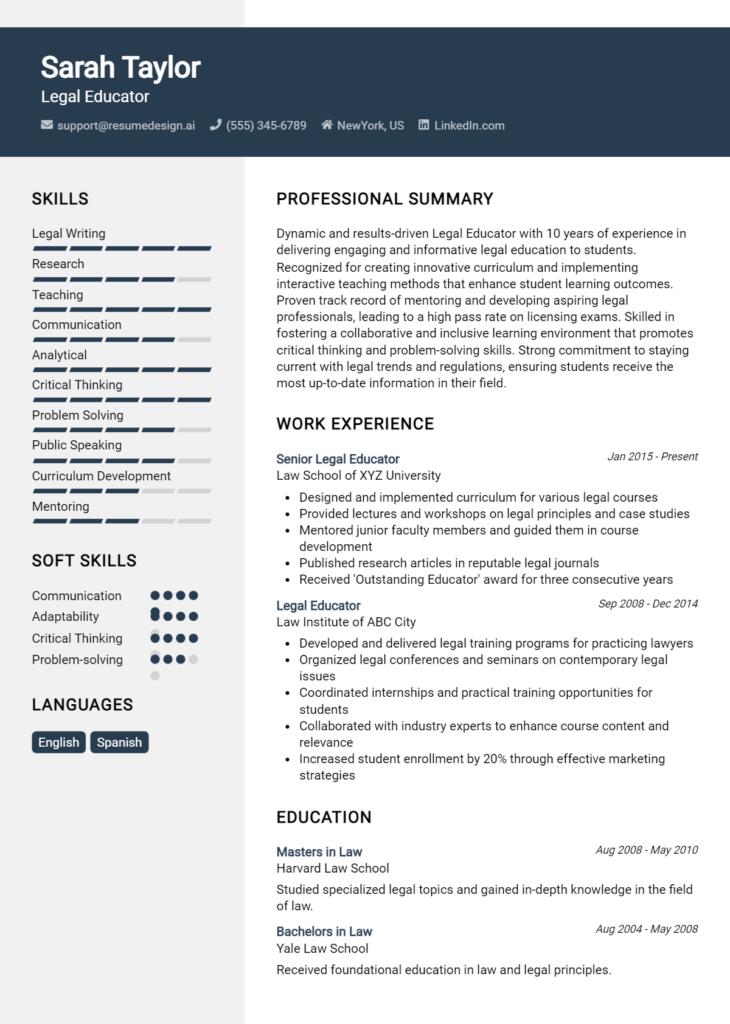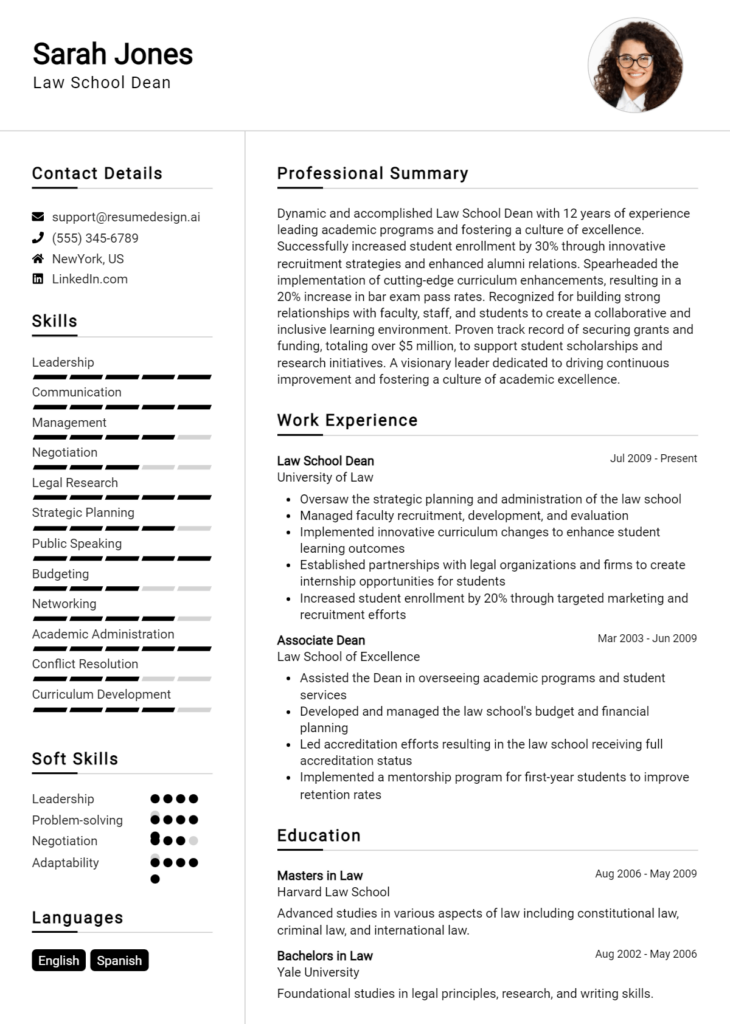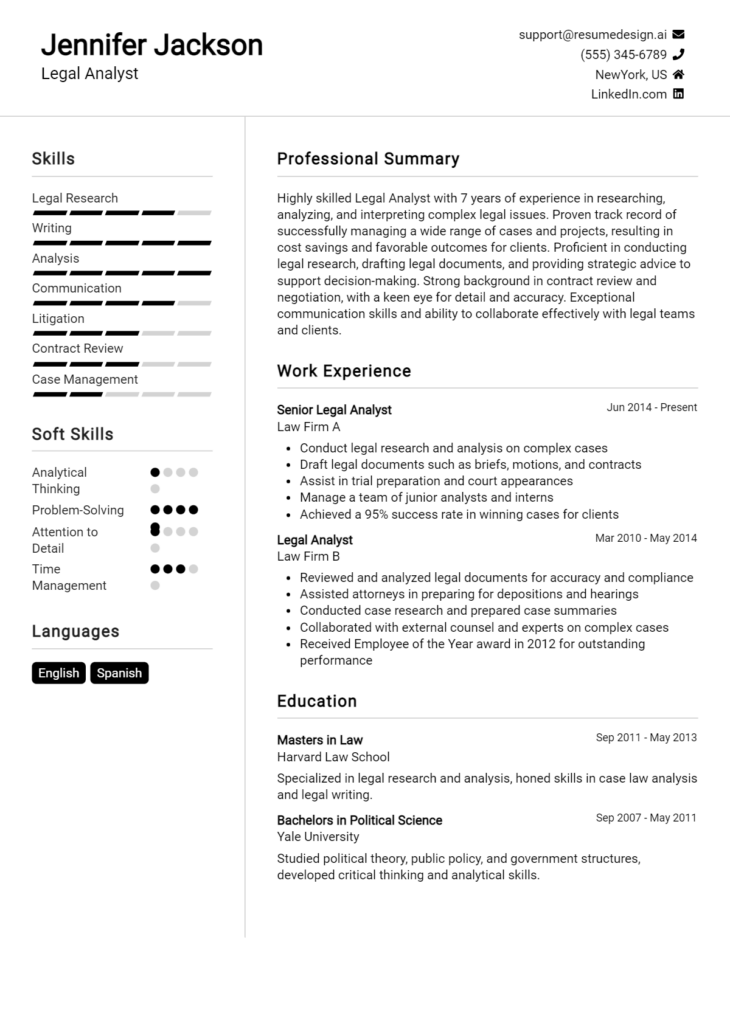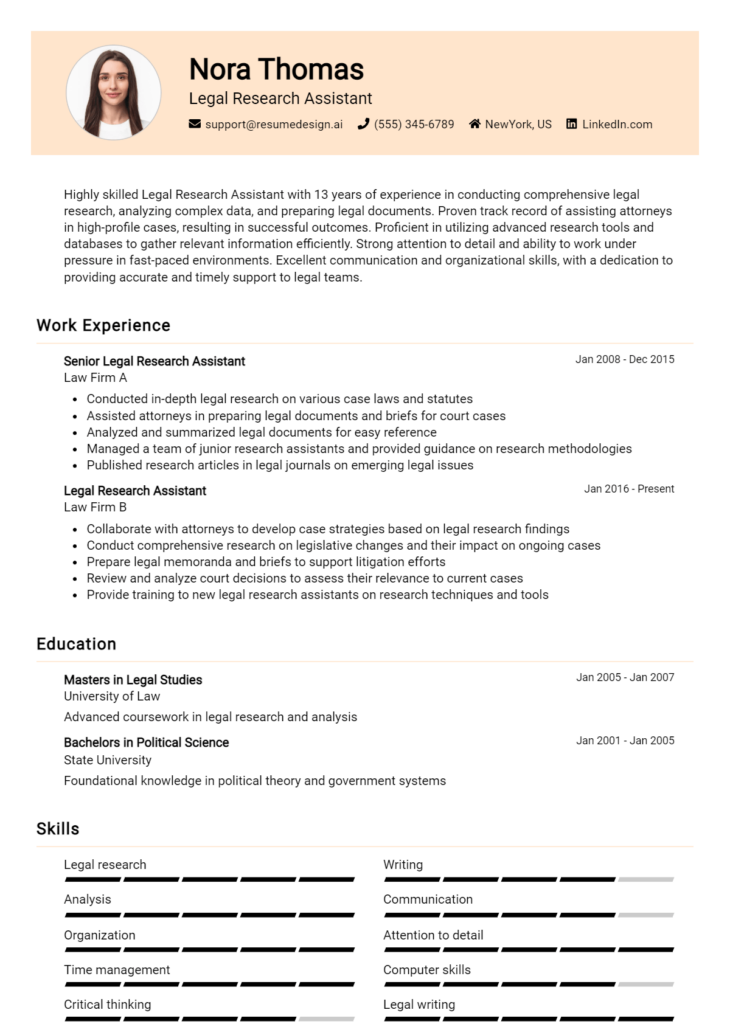Legal Research Fellow Core Responsibilities
A Legal Research Fellow plays a crucial role in bridging various departments, providing essential legal insights that inform policy-making and operational strategies. Key responsibilities include conducting thorough legal research, analyzing statutes and case law, and drafting comprehensive reports. Proficiency in technical and analytical skills is vital, as is the ability to problem-solve effectively. These skills contribute significantly to the organization’s objectives, and a well-structured resume can effectively showcase these qualifications, enhancing the candidate's prospects.
Common Responsibilities Listed on Legal Research Fellow Resume
- Conduct in-depth legal research on various topics and issues.
- Analyze and summarize statutes, regulations, and case law.
- Draft legal memoranda and reports for internal use.
- Assist in preparing legal briefs and documentation.
- Collaborate with attorneys and other departments on legal matters.
- Stay updated on current legal trends and changes in legislation.
- Organize and maintain legal research databases and resources.
- Support litigation efforts by gathering relevant information.
- Participate in legal training sessions and workshops.
- Conduct comparative legal analysis as needed.
- Assist in policy development and review processes.
- Provide insights to enhance compliance and risk management strategies.
High-Level Resume Tips for Legal Research Fellow Professionals
In the competitive field of legal research, a well-crafted resume can be the defining factor that sets a candidate apart from the rest. For Legal Research Fellow professionals, the resume often serves as the first impression made on potential employers, making it crucial to present a clear and compelling picture of both skills and achievements. A resume that effectively highlights relevant experiences and competencies can open doors to exciting opportunities in legal academia, research institutions, and beyond. This guide will provide practical and actionable resume tips specifically tailored for Legal Research Fellow professionals to help you create a standout application.
Top Resume Tips for Legal Research Fellow Professionals
- Tailor your resume to the job description by incorporating keywords and phrases that align with the specific requirements and responsibilities of the Legal Research Fellow position.
- Highlight relevant legal research experience, including internships, clerkships, and any scholarly work that demonstrates your ability to conduct thorough and efficient research.
- Quantify your achievements by including metrics or specific outcomes, such as the number of cases researched, publications authored, or projects completed.
- Showcase your familiarity with legal research tools and databases, such as Westlaw, LexisNexis, or other industry-specific software that is pertinent to the role.
- Include any specialized legal coursework or certifications that are relevant to the position, emphasizing your academic background and ongoing professional development.
- Utilize a clean and professional format that enhances readability, ensuring that your resume is easily navigable and visually appealing.
- Incorporate strong action verbs to describe your responsibilities and accomplishments, making your experience more dynamic and engaging.
- Consider including a summary statement at the top of your resume that encapsulates your expertise and career goals, tailored specifically to the Legal Research Fellow role.
- Keep your resume concise, ideally one page, focusing on the most relevant information that underscores your qualifications and potential contributions.
Implementing these tips can significantly increase your chances of landing a position in the Legal Research Fellow field. By effectively showcasing your experience, skills, and achievements, you can create a compelling narrative that resonates with potential employers and demonstrates your readiness for this critical role in the legal landscape.
Why Resume Headlines & Titles are Important for Legal Research Fellow
In the competitive field of legal research, a well-crafted resume headline or title plays a crucial role in capturing the attention of hiring managers. It serves as the first impression a candidate makes, encapsulating their key qualifications in a concise and impactful phrase. A strong headline can immediately communicate a candidate's expertise and relevance to the position of a Legal Research Fellow, distinguishing them from a pool of applicants. Therefore, it is essential that the headline is not only relevant to the job being applied for but also succinct, allowing hiring managers to quickly assess the candidate's suitability for the role.
Best Practices for Crafting Resume Headlines for Legal Research Fellow
- Keep it concise: Aim for one impactful phrase that captures your qualifications.
- Be role-specific: Use keywords and terminology relevant to the Legal Research Fellow position.
- Highlight key strengths: Focus on your most impressive skills or accomplishments.
- Use action verbs: Start with strong action verbs to convey your contributions effectively.
- Tailor for each application: Customize your headline for the specific job description.
- Include relevant education: Mention degrees or certifications pertinent to the legal field.
- Avoid jargon: Ensure clarity by avoiding overly technical terms that may confuse readers.
- Make it attention-grabbing: Use compelling language that piques interest and invites further reading.
Example Resume Headlines for Legal Research Fellow
Strong Resume Headlines
"Detail-Oriented Legal Research Fellow with Expertise in Constitutional Law"
"Results-Driven Legal Researcher Specializing in Intellectual Property Analysis"
"Dedicated Legal Research Fellow with Proven Track Record in Case Law Analysis"
"Analytical Legal Researcher with Advanced Skills in Westlaw and LexisNexis"
Weak Resume Headlines
"Legal Research Fellow"
"Seeking Opportunities in Law"
The strong headlines provided are effective because they not only specify the candidate's area of expertise but also highlight unique strengths and qualifications that align with the expectations of a Legal Research Fellow. They are tailored to present clear and relevant information, making it easy for hiring managers to recognize the candidate's suitability at a glance. In contrast, the weak headlines fail to impress due to their vagueness and lack of specificity; they do not convey any meaningful information about the candidate's qualifications or the value they bring to the role, thus missing the opportunity to stand out in a competitive job market.
Writing an Exceptional Legal Research Fellow Resume Summary
A well-crafted resume summary is a pivotal component for a Legal Research Fellow seeking to make an impactful first impression. This section serves as a concise narrative that highlights the candidate's key skills, relevant experience, and notable accomplishments tailored to the specific requirements of the role. A strong summary not only captures the attention of hiring managers but also provides a snapshot of the candidate’s qualifications, demonstrating their potential value to the organization. By being succinct and targeted, the summary increases the likelihood of the candidate advancing to the interview stage.
Best Practices for Writing a Legal Research Fellow Resume Summary
- Quantify Achievements: Use specific numbers to illustrate success, such as the number of cases researched or reports produced.
- Focus on Relevant Skills: Highlight skills that are directly applicable to the role, such as legal writing, analytical thinking, or familiarity with specific legal databases.
- Tailor the Summary: Customize your summary to align with the job description, emphasizing the most relevant experiences and qualifications.
- Be Concise: Limit your summary to 3-5 sentences to maintain clarity and impact.
- Use Strong Action Verbs: Start sentences with powerful verbs to convey confidence and proactivity.
- Highlight Key Accomplishments: Mention any awards, publications, or recognitions that demonstrate expertise in legal research.
- Showcase Interdisciplinary Knowledge: If applicable, mention any cross-disciplinary skills or knowledge that enhance your legal research capabilities.
- Maintain Professional Tone: Ensure the language is formal and professional, reflecting the standards of the legal field.
Example Legal Research Fellow Resume Summaries
Strong Resume Summaries
Detail-oriented Legal Research Fellow with over 3 years of experience conducting comprehensive legal research and drafting over 50 case memos, resulting in a 30% increase in case efficiency for a leading law firm.
Results-driven legal researcher skilled in using advanced legal databases and analytical tools, having authored 5 published articles in reputable legal journals, enhancing firm visibility and academic credibility.
Dedicated Legal Research Fellow with a proven track record of assisting in the preparation of trial briefs and motions, contributing to successful outcomes in 90% of cases handled during internship tenure.
Weak Resume Summaries
I am a legal research professional looking for opportunities to grow in my career.
Experienced in legal research and writing, I have worked on various projects and am eager to learn more.
The examples provided highlight the differences between strong and weak resume summaries. Strong summaries are effective due to their specificity, quantifiable results, and relevance to the Legal Research Fellow role, showcasing a clear understanding of the position's demands. In contrast, the weak summaries lack detail, provide no measurable outcomes, and fail to convey a distinct value proposition, making them less compelling to hiring managers.
Work Experience Section for Legal Research Fellow Resume
The work experience section is a critical component of a Legal Research Fellow resume, as it provides potential employers with insight into the candidate's practical skills and their ability to contribute effectively to legal research projects. This section highlights the candidate's technical proficiencies, leadership abilities in managing teams, and their commitment to delivering high-quality outputs. By quantifying achievements and ensuring alignment with industry standards, candidates can demonstrate not only their expertise but also their impact in previous roles, making them more appealing to prospective employers.
Best Practices for Legal Research Fellow Work Experience
- Highlight specific legal research methodologies and tools utilized in projects.
- Quantify achievements with metrics, such as the number of cases researched or reports produced.
- Demonstrate leadership by detailing experiences in managing research teams or projects.
- Illustrate collaboration by mentioning partnerships with legal professionals or academic institutions.
- Describe complex legal issues addressed and the outcomes of the research conducted.
- Use action verbs to convey impact and engagement in each role.
- Tailor experiences to reflect the skills and requirements listed in the job description.
- Include any relevant publications or presentations that resulted from your research efforts.
Example Work Experiences for Legal Research Fellow
Strong Experiences
- Led a team of 5 researchers to conduct a comprehensive analysis of environmental law cases, resulting in a report that influenced legislative changes and was cited in over 10 legal journals.
- Developed and implemented a new legal research database that increased efficiency by 30%, allowing for faster retrieval of case law and statutes.
- Collaborated with a cross-disciplinary team to publish a peer-reviewed article on intellectual property rights that achieved recognition at a national conference.
- Managed a project that reviewed over 200 legal documents, identifying key trends that led to a successful outcome in a high-stakes litigation case.
Weak Experiences
- Assisted in legal research tasks as needed.
- Worked on various projects without specifying contributions or results.
- Helped with document review but did not detail the scope or impact of the work.
- Participated in team meetings and discussions.
The examples categorized as strong experiences are characterized by their specificity, quantifiable results, and clear demonstration of leadership and collaboration. They provide concrete evidence of the candidate's contributions and the outcomes of their work. In contrast, the weak experiences lack detail and fail to convey the candidate's impact, making them less compelling to potential employers. Clear, measurable achievements and a focus on relevant skills are essential for standing out in the competitive field of legal research.
Education and Certifications Section for Legal Research Fellow Resume
The education and certifications section of a Legal Research Fellow resume is a crucial component that showcases the candidate's academic qualifications and their commitment to continuous learning in the legal field. This section provides potential employers with insights into the candidate's educational background, highlighting relevant degrees and specialized training that align with the requirements of the role. Additionally, industry-relevant certifications not only enhance the candidate's credibility but also demonstrate their dedication to staying updated with the evolving legal landscape. By detailing pertinent coursework, certifications, and any specialized training, candidates can effectively position themselves as qualified and knowledgeable individuals ready to contribute meaningfully to legal research projects.
Best Practices for Legal Research Fellow Education and Certifications
- Prioritize relevant degrees, such as Juris Doctor (JD) or Master’s in Legal Studies, that directly relate to the legal field.
- Include industry-recognized certifications, such as Certified Legal Research Specialist or any specialized legal research training.
- Detail relevant coursework that showcases expertise in legal research methodologies, case law analysis, and legal writing.
- List honors or awards received during academic tenure that highlight academic excellence or research capabilities.
- Keep the section concise yet informative, focusing on qualifications that directly support the role of Legal Research Fellow.
- Update the section regularly to reflect new certifications or educational advancements.
- Consider including participation in workshops or seminars related to legal research to demonstrate ongoing professional development.
- Utilize a clean and organized format that makes it easy for employers to quickly identify relevant qualifications.
Example Education and Certifications for Legal Research Fellow
Strong Examples
- Juris Doctor (JD), Harvard Law School, 2021
- Certified Legal Research Specialist (CLRS), National Association of Legal Professionals, 2022
- Advanced Legal Research Techniques, Online Course, University of California, 2023
- Research Assistant, Legal Research and Writing, Harvard Law Review, 2020
Weak Examples
- Bachelor of Arts in History, State University, 2015
- Real Estate License, State Licensing Board, 2018
- Certification in Microsoft Office Suite, 2019
- Completion of a Basic Cooking Course, Local Community Center, 2020
The strong examples listed above are considered robust because they directly relate to the skills and knowledge necessary for a Legal Research Fellow, showcasing relevant legal education and specialized training. In contrast, the weak examples lack relevance to the legal field and do not enhance the candidate's qualifications for the role. By focusing on pertinent degrees, certifications, and experience, candidates can better align their education and certifications section with the expectations of potential employers in the legal sector.
Top Skills & Keywords for Legal Research Fellow Resume
A Legal Research Fellow plays a crucial role in the legal field, often assisting in the development of case law, policy analysis, and legal scholarship. To stand out in a competitive job market, it is essential for candidates to highlight their skills effectively in their resumes. A well-crafted resume that emphasizes both hard and soft skills can demonstrate a candidate’s ability to contribute meaningfully to legal research projects and support legal practitioners. Prospective employers are keen to see a blend of analytical abilities, attention to detail, and interpersonal skills, all of which are vital in navigating the complexities of legal research. For those looking to enhance their resumes, understanding and showcasing these skills can be a significant advantage.
Top Hard & Soft Skills for Legal Research Fellow
Soft Skills
- Analytical Thinking
- Communication Skills
- Problem-Solving
- Attention to Detail
- Time Management
- Interpersonal Skills
- Adaptability
- Research Orientation
- Team Collaboration
- Critical Thinking
Hard Skills
- Legal Writing
- Case Law Analysis
- Statutory Interpretation
- Westlaw and LexisNexis Proficiency
- Legal Research Methodologies
- Knowledge of Legal Procedures
- Drafting Legal Documents
- Data Analysis
- Familiarity with Legal Databases
- Citation and Referencing Skills
Stand Out with a Winning Legal Research Fellow Cover Letter
I am writing to express my interest in the Legal Research Fellow position at [Organization Name], as advertised on [where you found the job listing]. With a strong academic background in law and extensive experience in legal research, I am excited about the opportunity to contribute to your team while further developing my skills in a dynamic and challenging environment. My passion for legal scholarship and commitment to advancing legal knowledge align perfectly with the mission of [Organization Name].
During my time at [University Name], I honed my research and analytical skills through various projects, including my thesis on [specific topic]. This experience required me to dissect complex legal issues, engage with a range of scholarly resources, and present findings in a clear and concise manner. Additionally, my internship at [Previous Organization or Firm] equipped me with practical skills in legal writing, case analysis, and the application of statutes and case law. I am adept at utilizing legal databases such as Westlaw and LexisNexis, which I believe will be valuable in conducting thorough and comprehensive research for your organization.
I am particularly drawn to this fellowship because of [specific aspect of the organization or program, such as a project, reputation, or values]. I admire your commitment to [mention a relevant value or project], and I am eager to contribute my skills to support this mission. I am confident that my attention to detail, ability to work collaboratively in a team, and dedication to producing high-quality research will make me a valuable asset to your team.
Thank you for considering my application. I look forward to the opportunity to discuss how my background, skills, and enthusiasm for legal research can benefit [Organization Name]. I am eager to bring my knowledge and passion for law to your esteemed organization and help advance the important work you do.
Conclusion
As we explored the essential skills and qualifications for a Legal Research Fellow, we highlighted the importance of analytical thinking, attention to detail, and proficiency in legal research methodologies. A successful candidate not only demonstrates a strong academic background but also showcases practical experience in legal analysis and writing. Additionally, networking and mentorship can play a crucial role in navigating this competitive field.
To maximize your chances of landing a Legal Research Fellow position, it's vital to have a polished and professional resume that effectively communicates your qualifications. We encourage you to take a moment to review your resume and ensure it aligns with the demands of this role.
Consider utilizing available resources to enhance your application materials. You can access resume templates to create a visually appealing format, use the resume builder for a user-friendly creation process, and check out resume examples for inspiration. Don't forget to complement your resume with a well-crafted cover letter by exploring our cover letter templates.
Take action now and elevate your application to stand out in the competitive landscape of legal research fellowships!

